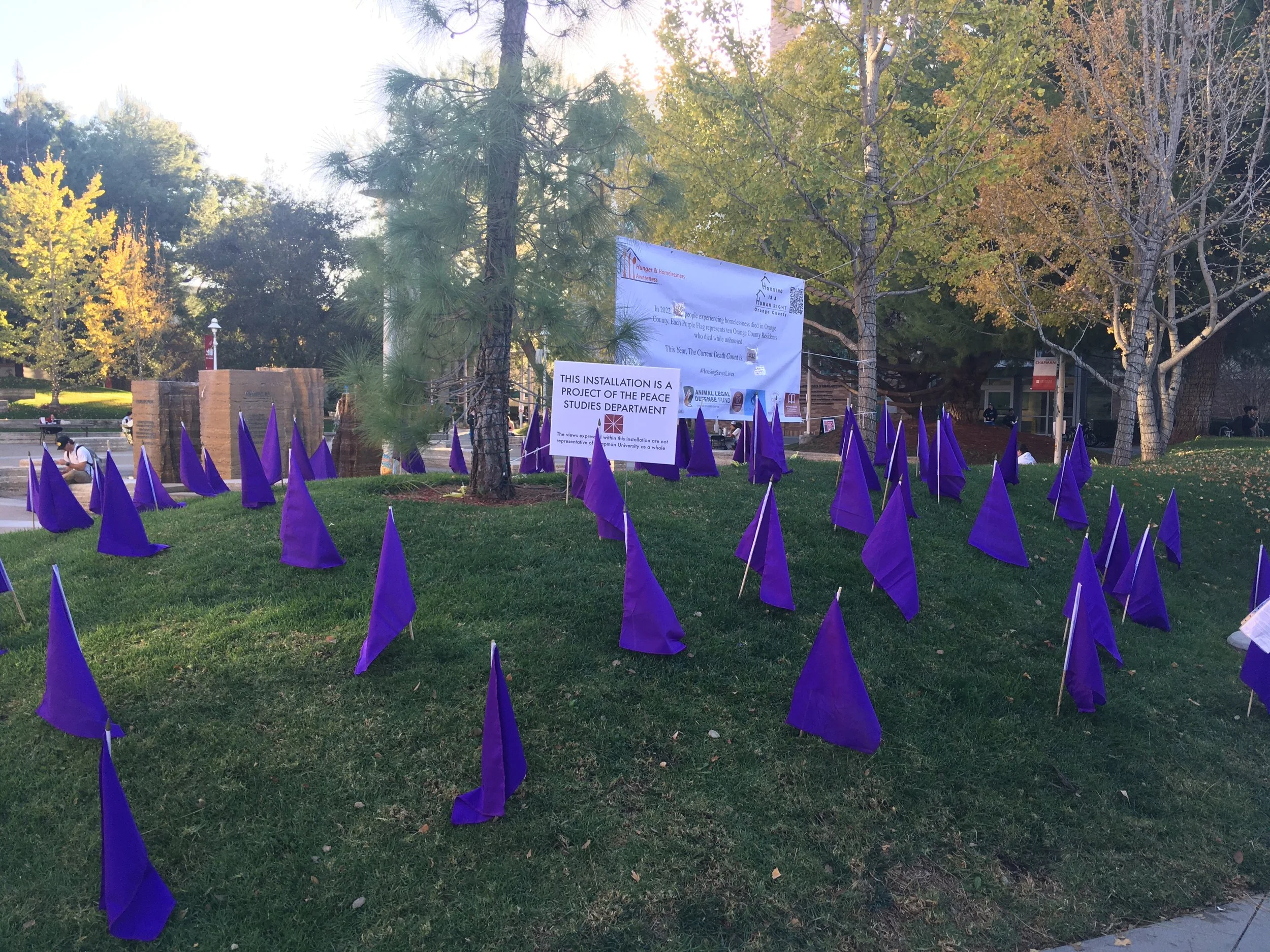Purple Flag commemorative exhibit honors unhoused Orange County residents who died in 2022
Chapman’s Homeless Policy Practicum, Department of Peace Studies and law student organizations united together last month to support the installation of an on-campus Purple Flag exhibit that showcases a visual depiction of individuals in Orange County who lost their lives and were unhoused. Photos courtesy of Prof. Wendy Seiden
Chapman University supported the installation of a Purple Flag exhibit on Atallah Piazza to showcase the 495 unhoused Orange County residents who died in 2022. Each purple flag represents 10 individuals who died in 2022 without a stable residence.
Last year, at least 430 unhoused residents in OC died.
According to the 2022 Point in Time Summary, an annual report tracking homelessness in the county, 3,057 individuals are unsheltered. According to the data, 300 are persons aged 62 and older, 145 are veterans and 109 are transitional-aged youth between 18 and 24 years old.
The Purple Flag exhibit, held on Dec. 5, was brought to the university through a collaboration of a local volunteer coalition called Housing is a Human Right Orange County, along with the Nonviolent Social Change course held by Chapman’s Peace Studies Department and the Homeless Policy Practicum, a clinical course at the Fowler School of Law.
The exhibit was co-sponsored by six law student organizations: the Veterans Advocacy Law Society, the Public Interest Law Foundation, the Chapman Women Lawyers Association, the International Law Society, the Environment Law Society and the Animal Legal Defense Fund.
In the Homeless Policy Practicum, taught by Professor Wendy Seiden, students undertake legal and policy research, and they also collaborate with statewide coalitions and grassroots community groups in an effort to reduce homelessness, increase justice for unhoused individuals and promote housing security.
Seiden said that the epidemic of homelessness can end if everyone can make a meaningful contribution to combat homelessness.
“The fact that almost 500 Orange County residents died while unhoused in 2022 is unconscionable -- and worse that (the) numbers only increased in 2023,” Seiden told The Panther. “But what I really want folks to realize is that we can do something about it. Housing should be a human right, and we are not helpless to just let this happen. We can change the script and change the outcome.”
She also said that in order to combat homelessness, the issue needs to be understood and viewed from a humanitarian and fiscal perspective.
“We need to look at this issue holistically from both a humanitarian and fiscal point of view. Orange County residents are most often unhoused because of job loss, health issues, lack of family support, eviction and, as research has shown, the high price of housing,” Seiden said.
Seiden continued: “Recent studies also demonstrate that it costs the government much more to have an unhoused population than to house them with services. We need to put current funding into low-cost and subsidized housing while providing social and humanitarian services to individuals who are not yet housed, as well as to newly housed individuals and families.”
The Department of Peace Studies’s course on Nonviolent Social Change, taught by Hilmi Ulas, also took action to co-sponsor the exhibit.
Elliot Mathis, a junior peace studies and psychology double major, learned about the Purple Flag Exhibit through the Nonviolent Social Change class. While doing an activism project on foster care youth, she decided to contribute to the Purple Flag exhibit when learning about the overlap between foster care and homelessness.
According to the 2022 Point in Time report, 721 children under the age of 18 were experiencing homelessness in Orange County. However, according to the Orange County Grand Jury 2022-2023 report, a staggering count of 23,246 children identified by 28 school districts in Orange County are homeless. The report states that although the number of children experiencing homelessness is high, the numbers aren’t an accurate portrayal because those that remain unidentified experiencing homelessness are not included.
“People are going to be thinking of Disneyland and Newport and Laguna and all the OC beautiful spots that we know and love, but quite literally down the street, there’s a heavy homeless population in Orange County,” said Mathis, who is minoring in sociology.
Mathis continued: “I think the purple heart flag commemorative, just especially for the students walking by, can be kind of a visual representation of ‘Dang, this is our community, and there’s lives being lost within our community literally down the street.’ So I think just giving people a chance to reflect on that is a start in terms of activism and increasing awareness, which is exactly what the Purple Hearts Commemorative did.”


